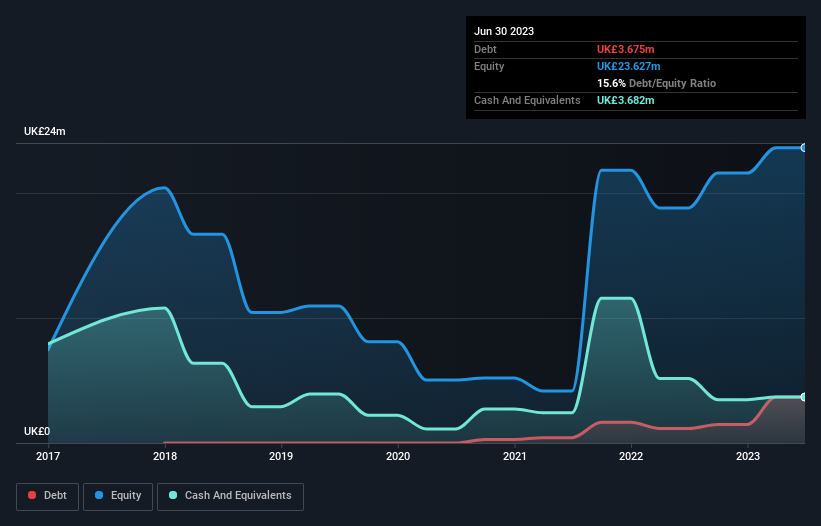The external fund manager backed by Berkshire Hathaway's Charlie Munger, Li Lu, makes no bones about it when he says 'The biggest investment risk is not the volatility of prices, but whether you will suffer a permanent loss of capital.' When we think about how risky a company is, we always like to look at its use of debt, since debt overload can lead to ruin. As with many other companies XP Factory Plc (LON:XPF) makes use of debt. But is this debt a concern to shareholders?
When Is Debt A Problem?
Generally speaking, debt only becomes a real problem when a company can't easily pay it off, either by raising capital or with its own cash flow. In the worst case scenario, a company can go bankrupt if it cannot pay its creditors. However, a more common (but still painful) scenario is that it has to raise new equity capital at a low price, thus permanently diluting shareholders. By replacing dilution, though, debt can be an extremely good tool for businesses that need capital to invest in growth at high rates of return. When we examine debt levels, we first consider both cash and debt levels, together.
See our latest analysis for XP Factory
What Is XP Factory's Net Debt?
The image below, which you can click on for greater detail, shows that at June 2023 XP Factory had debt of UK£3.68m, up from UK£1.16m in one year. But it also has UK£3.68m in cash to offset that, meaning it has UK£7.0k net cash.

A Look At XP Factory's Liabilities
Zooming in on the latest balance sheet data, we can see that XP Factory had liabilities of UK£15.5m due within 12 months and liabilities of UK£27.2m due beyond that. Offsetting this, it had UK£3.68m in cash and UK£12.3m in receivables that were due within 12 months. So its liabilities outweigh the sum of its cash and (near-term) receivables by UK£26.6m.
Given this deficit is actually higher than the company's market capitalization of UK£25.0m, we think shareholders really should watch XP Factory's debt levels, like a parent watching their child ride a bike for the first time. Hypothetically, extremely heavy dilution would be required if the company were forced to pay down its liabilities by raising capital at the current share price. XP Factory boasts net cash, so it's fair to say it does not have a heavy debt load, even if it does have very significant liabilities, in total. The balance sheet is clearly the area to focus on when you are analysing debt. But ultimately the future profitability of the business will decide if XP Factory can strengthen its balance sheet over time. So if you're focused on the future you can check out this free report showing analyst profit forecasts.
Over 12 months, XP Factory reported revenue of UK£33m, which is a gain of 140%, although it did not report any earnings before interest and tax. So its pretty obvious shareholders are hoping for more growth!
So How Risky Is XP Factory?
By their very nature companies that are losing money are more risky than those with a long history of profitability. And in the last year XP Factory had an earnings before interest and tax (EBIT) loss, truth be told. Indeed, in that time it burnt through UK£2.7m of cash and made a loss of UK£137k. Given it only has net cash of UK£7.0k, the company may need to raise more capital if it doesn't reach break-even soon. The good news for shareholders is that XP Factory has dazzling revenue growth, so there's a very good chance it can boost its free cash flow in the years to come. While unprofitable companies can be risky, they can also grow hard and fast in those pre-profit years. The balance sheet is clearly the area to focus on when you are analysing debt. But ultimately, every company can contain risks that exist outside of the balance sheet. To that end, you should be aware of the 2 warning signs we've spotted with XP Factory .
At the end of the day, it's often better to focus on companies that are free from net debt. You can access our special list of such companies (all with a track record of profit growth). It's free.
New: AI Stock Screener & Alerts
Our new AI Stock Screener scans the market every day to uncover opportunities.
• Dividend Powerhouses (3%+ Yield)
• Undervalued Small Caps with Insider Buying
• High growth Tech and AI Companies
Or build your own from over 50 metrics.
Have feedback on this article? Concerned about the content? Get in touch with us directly. Alternatively, email editorial-team (at) simplywallst.com.
This article by Simply Wall St is general in nature. We provide commentary based on historical data and analyst forecasts only using an unbiased methodology and our articles are not intended to be financial advice. It does not constitute a recommendation to buy or sell any stock, and does not take account of your objectives, or your financial situation. We aim to bring you long-term focused analysis driven by fundamental data. Note that our analysis may not factor in the latest price-sensitive company announcements or qualitative material. Simply Wall St has no position in any stocks mentioned.
About AIM:XPF
XP Factory
Engages in the leisure businesses in the United Kingdom, Europe, and internationally.
Reasonable growth potential and fair value.
Market Insights
Community Narratives




